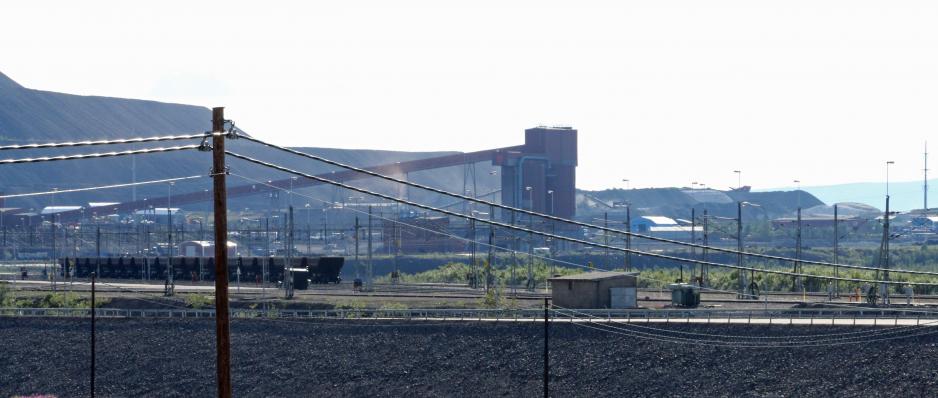Swedish Industries Will Still Have Cement Following Court Decision

Cementa is Sweden's largest producer of cement and supplies 75% of Sweden's cement. Cementa supplies enormous quantities of the product to the mining company LKAB in Northern Sweden, among others. It is used in the production of concrete which reinforces walls and roofs in underground mines, such as here at LKAB's mine in Kiruna in Northern Sweden. (Photo: Fredric Alm / LKAB)
After much controversy, Cementa is allowed to continue its lime extraction for four more years. A lot was at stake for the Swedish industry as the company accounts for 75 percent of the cement supply in Sweden.
Major investments in industry and climate adaptation were at stake before the Swedish Land and Environment Courts on Tuesday made their decision on Cementa's application for further lime extraction.
Cementa extracts lime for cement production on the island of Gotland in the Baltic Sea and produces up to 3/4 of the cement used in Sweden.
On Tuesday, the Swedish Land and Environment Courts could announce that the company is allowed to continue extracting lime at their factory in Slite, Gotland for four more years.
As High North News has previously reported, a halt in cement production in Gotland could have major consequences for Swedish industries.
Crucial for industry in the North
Major investments and climate adaptation of the industry is currently taking place in Northern Sweden. Large investments are made in fossil-free production, green steel, batteries, and wind power, among other things.
The mining company LKAB is a central actor in this shift. The company operates iron ore mines in Norrbotten and annually buys approximately 150 000 tonnes of cement to produce concrete. The majority of this comes from Cementa. For LKAB, concrete is central in the reinforcement of walls and roofs in underground mines.
Managing Director of Norrbotten Chamber of Commerce Linda Nilsson has previously stated to High North News that the situation was not only serious for LKAB but for the entirety of Norrbotten and the entire Swedish economy.
"In addition to the construction industry in the country, the mining industry, infrastructure, ports, roads, railways, wind power plants, and aircraft will be affected. In Norrbotten, what is expected to be Europe's largest land-based wind power park, Markbygden, is currently under construction. Its foundation requires large amounts of cement and concrete. This investment alone constitutes SEK 60 billion," specified Nilsson.

The Swedish state-owned mining company LKAB is the largest producer of iron ore in Europe. The company operates the iron ore mine in the city of Kiruna in Northern Sweden. (Photo: Arne O. Holm)
"Must become more predictable"
"The supply of raw materials is part of Sweden's national preparedness. It is difficult to equip hospitals, railways, and shelters without concrete," says Catharina Elmsäter-Svärd, CEO of the industry and employer organization the Swedish Construction Federation.
According to the Swedish Construction Federation's impact assessment, 160 000 jobs are estimated lost in 2023 in the case of a production halt in Slite, assuming that some of the production is maintained with the help of external stone.
In a press release, they point out that the permit processes must become more predictable, and that it must consider the need for a secure supply of raw materials in a better way than today.
"The availability of cement is a prerequisite for the green shift in the form of expanded wind powers," says Elmsäter-Svärd of the Swedish Construction Federation in the press release.
"The construction industry will keep an eye on the ongoing legal process," she adds.
Great uncertainty
There has been great uncertainty over time about whether Cementa will be able to continue its cement production.
In 2021, a cement crisis was announced as the Swedish Land and Environment Courts first rejected Cementa's application for a renewed extraction permit after the 1st of November of the same year.
To secure the cement supply in Sweden, the Swedish government finally came forward with a proposal for a time-limited permit which was approved by the Swedish Parliament, and which the company has worked within the framework of until now. This permit, however, expires on the 31st of December 2022.
In April this year, Cementa applied for a continued permit to continue its mining in Slite for a period of four years.
The company specifies that a short-time permit such as this is a necessary solution to keep up the cement supply in Sweden for the time Cementa's application for a longer permit of 20-30 years is processed. Cementa is planning to apply for a longer permit in 2023.
Environmental concerns
Drinking water concerns and environmental protection in Gotland have been central in the case of Cementa's further production.
When the Swedish Land and Environment Courts rejected the new permit for lime extraction in 2021, this was justified by the fact that the impact on the groundwater had not been sufficiently investigated.
"Authorities and individuals have protested that Cementa's assessment, which supports the application, does not take into account the impact the mining, and the groundwater diversion above all, has had in Slite thus far," states the Swedish Land and Environment Court in a press release.
According to the court, however, there was no reason to reject Cementa's application.
"Cementa has put forth a sufficient basis for the investigation that the Land and Environment Court will carry out, and that basis shows that continued groundwater diversion over a period of four years will not harm the nature types in the Natura 2000 area nor endanger the drinking water supply, says the courts presiding councillor Karin Röckert. Natura 2000 is an EU network that works to protect and preserve biological diversity.
Also read
This article was originally published in Norwegian and has been translated by Birgitte Annie Molid Martinussen.





